Business Management Report: Entrepreneurship in Accenture London
VerifiedAdded on 2020/01/07
|9
|2053
|283
Report
AI Summary
This report delves into the realm of business management, focusing on entrepreneurship and its core elements. It begins by outlining the characteristics, traits, and skills of successful entrepreneurs, emphasizing passion, open-mindedness, expertise, and self-confidence. The report then explores how entrepreneurial personality traits, such as vision, adaptability, and resilience, reflect entrepreneurial motivation and mindset. It examines different perspectives on entrepreneurial characteristics, addressing the debate of whether entrepreneurs are born or made. Furthermore, the report analyzes the impact of background and experience on entrepreneurship, providing examples and critically evaluating both positive and negative influences. The report concludes by highlighting the significance of small business management in the UK economy and the role of entrepreneurial characteristics in fostering success, with a focus on Accenture London.

BUSINESS
MANAGEMENT
MANAGEMENT
Paraphrase This Document
Need a fresh take? Get an instant paraphrase of this document with our AI Paraphraser
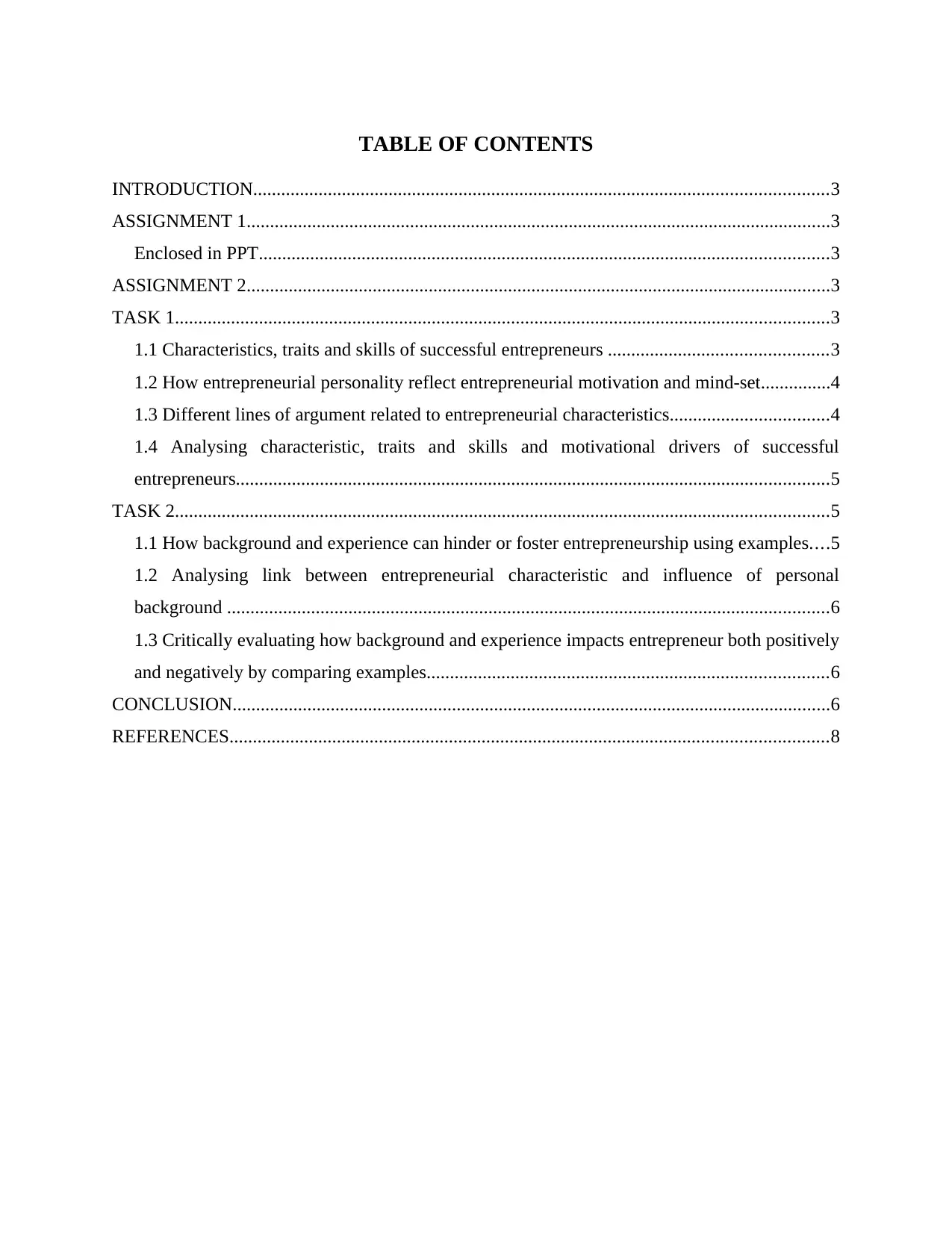
TABLE OF CONTENTS
INTRODUCTION...........................................................................................................................3
ASSIGNMENT 1.............................................................................................................................3
Enclosed in PPT..........................................................................................................................3
ASSIGNMENT 2.............................................................................................................................3
TASK 1............................................................................................................................................3
1.1 Characteristics, traits and skills of successful entrepreneurs ...............................................3
1.2 How entrepreneurial personality reflect entrepreneurial motivation and mind-set...............4
1.3 Different lines of argument related to entrepreneurial characteristics..................................4
1.4 Analysing characteristic, traits and skills and motivational drivers of successful
entrepreneurs...............................................................................................................................5
TASK 2............................................................................................................................................5
1.1 How background and experience can hinder or foster entrepreneurship using examples....5
1.2 Analysing link between entrepreneurial characteristic and influence of personal
background .................................................................................................................................6
1.3 Critically evaluating how background and experience impacts entrepreneur both positively
and negatively by comparing examples......................................................................................6
CONCLUSION................................................................................................................................6
REFERENCES................................................................................................................................8
INTRODUCTION...........................................................................................................................3
ASSIGNMENT 1.............................................................................................................................3
Enclosed in PPT..........................................................................................................................3
ASSIGNMENT 2.............................................................................................................................3
TASK 1............................................................................................................................................3
1.1 Characteristics, traits and skills of successful entrepreneurs ...............................................3
1.2 How entrepreneurial personality reflect entrepreneurial motivation and mind-set...............4
1.3 Different lines of argument related to entrepreneurial characteristics..................................4
1.4 Analysing characteristic, traits and skills and motivational drivers of successful
entrepreneurs...............................................................................................................................5
TASK 2............................................................................................................................................5
1.1 How background and experience can hinder or foster entrepreneurship using examples....5
1.2 Analysing link between entrepreneurial characteristic and influence of personal
background .................................................................................................................................6
1.3 Critically evaluating how background and experience impacts entrepreneur both positively
and negatively by comparing examples......................................................................................6
CONCLUSION................................................................................................................................6
REFERENCES................................................................................................................................8
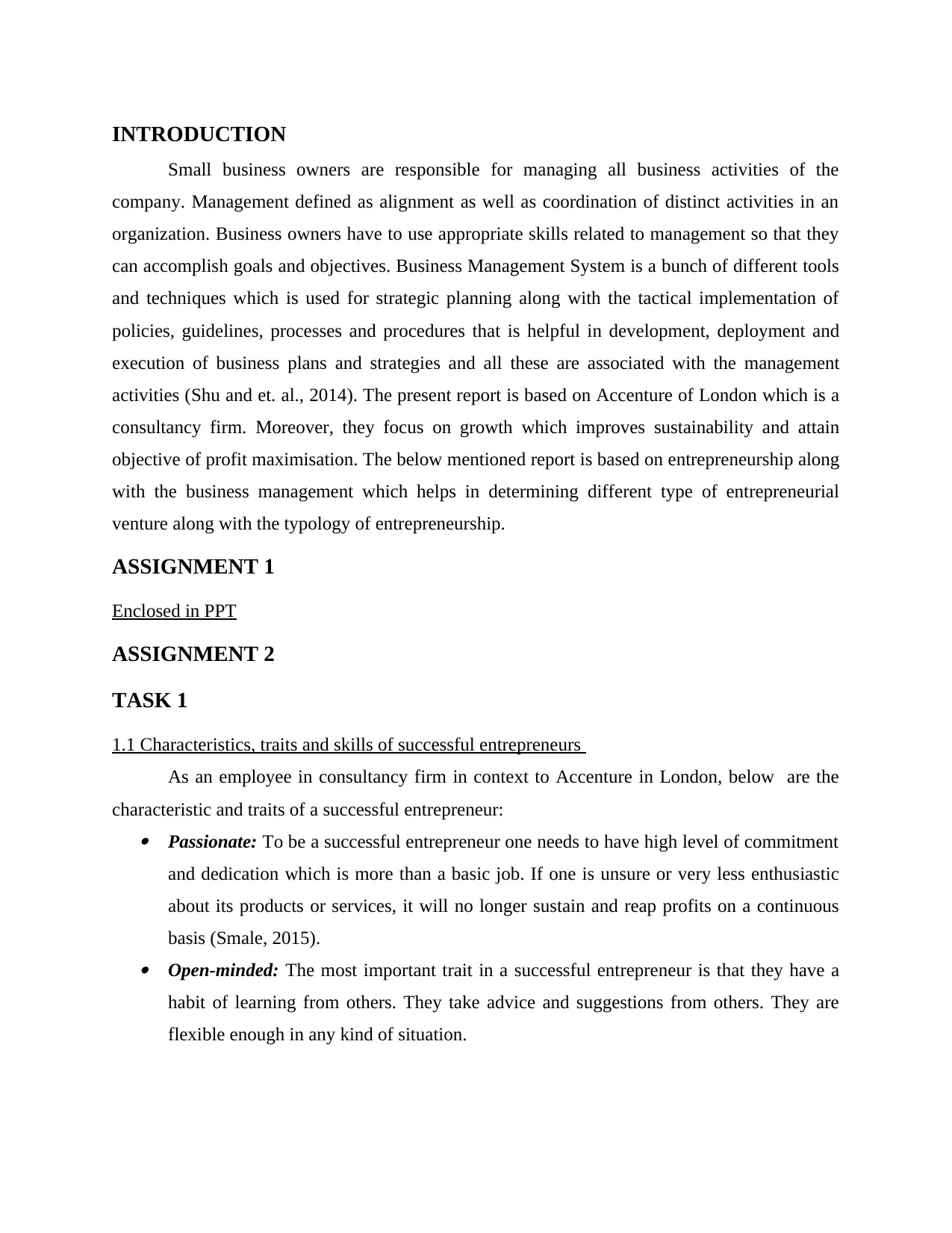
INTRODUCTION
Small business owners are responsible for managing all business activities of the
company. Management defined as alignment as well as coordination of distinct activities in an
organization. Business owners have to use appropriate skills related to management so that they
can accomplish goals and objectives. Business Management System is a bunch of different tools
and techniques which is used for strategic planning along with the tactical implementation of
policies, guidelines, processes and procedures that is helpful in development, deployment and
execution of business plans and strategies and all these are associated with the management
activities (Shu and et. al., 2014). The present report is based on Accenture of London which is a
consultancy firm. Moreover, they focus on growth which improves sustainability and attain
objective of profit maximisation. The below mentioned report is based on entrepreneurship along
with the business management which helps in determining different type of entrepreneurial
venture along with the typology of entrepreneurship.
ASSIGNMENT 1
Enclosed in PPT
ASSIGNMENT 2
TASK 1
1.1 Characteristics, traits and skills of successful entrepreneurs
As an employee in consultancy firm in context to Accenture in London, below are the
characteristic and traits of a successful entrepreneur: Passionate: To be a successful entrepreneur one needs to have high level of commitment
and dedication which is more than a basic job. If one is unsure or very less enthusiastic
about its products or services, it will no longer sustain and reap profits on a continuous
basis (Smale, 2015). Open-minded: The most important trait in a successful entrepreneur is that they have a
habit of learning from others. They take advice and suggestions from others. They are
flexible enough in any kind of situation.
Small business owners are responsible for managing all business activities of the
company. Management defined as alignment as well as coordination of distinct activities in an
organization. Business owners have to use appropriate skills related to management so that they
can accomplish goals and objectives. Business Management System is a bunch of different tools
and techniques which is used for strategic planning along with the tactical implementation of
policies, guidelines, processes and procedures that is helpful in development, deployment and
execution of business plans and strategies and all these are associated with the management
activities (Shu and et. al., 2014). The present report is based on Accenture of London which is a
consultancy firm. Moreover, they focus on growth which improves sustainability and attain
objective of profit maximisation. The below mentioned report is based on entrepreneurship along
with the business management which helps in determining different type of entrepreneurial
venture along with the typology of entrepreneurship.
ASSIGNMENT 1
Enclosed in PPT
ASSIGNMENT 2
TASK 1
1.1 Characteristics, traits and skills of successful entrepreneurs
As an employee in consultancy firm in context to Accenture in London, below are the
characteristic and traits of a successful entrepreneur: Passionate: To be a successful entrepreneur one needs to have high level of commitment
and dedication which is more than a basic job. If one is unsure or very less enthusiastic
about its products or services, it will no longer sustain and reap profits on a continuous
basis (Smale, 2015). Open-minded: The most important trait in a successful entrepreneur is that they have a
habit of learning from others. They take advice and suggestions from others. They are
flexible enough in any kind of situation.
⊘ This is a preview!⊘
Do you want full access?
Subscribe today to unlock all pages.

Trusted by 1+ million students worldwide
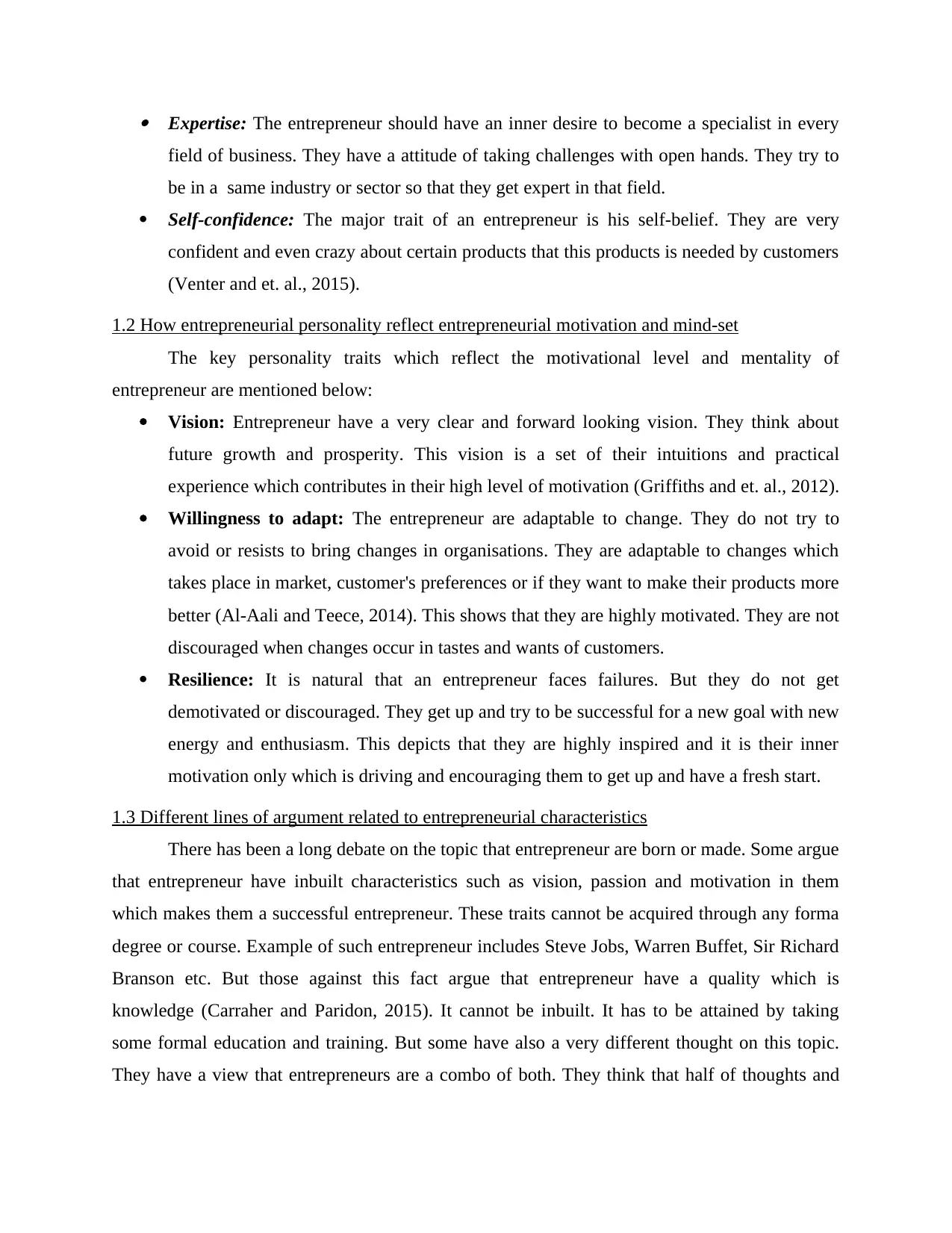
Expertise: The entrepreneur should have an inner desire to become a specialist in every
field of business. They have a attitude of taking challenges with open hands. They try to
be in a same industry or sector so that they get expert in that field.
Self-confidence: The major trait of an entrepreneur is his self-belief. They are very
confident and even crazy about certain products that this products is needed by customers
(Venter and et. al., 2015).
1.2 How entrepreneurial personality reflect entrepreneurial motivation and mind-set
The key personality traits which reflect the motivational level and mentality of
entrepreneur are mentioned below:
Vision: Entrepreneur have a very clear and forward looking vision. They think about
future growth and prosperity. This vision is a set of their intuitions and practical
experience which contributes in their high level of motivation (Griffiths and et. al., 2012).
Willingness to adapt: The entrepreneur are adaptable to change. They do not try to
avoid or resists to bring changes in organisations. They are adaptable to changes which
takes place in market, customer's preferences or if they want to make their products more
better (Al‐Aali and Teece, 2014). This shows that they are highly motivated. They are not
discouraged when changes occur in tastes and wants of customers.
Resilience: It is natural that an entrepreneur faces failures. But they do not get
demotivated or discouraged. They get up and try to be successful for a new goal with new
energy and enthusiasm. This depicts that they are highly inspired and it is their inner
motivation only which is driving and encouraging them to get up and have a fresh start.
1.3 Different lines of argument related to entrepreneurial characteristics
There has been a long debate on the topic that entrepreneur are born or made. Some argue
that entrepreneur have inbuilt characteristics such as vision, passion and motivation in them
which makes them a successful entrepreneur. These traits cannot be acquired through any forma
degree or course. Example of such entrepreneur includes Steve Jobs, Warren Buffet, Sir Richard
Branson etc. But those against this fact argue that entrepreneur have a quality which is
knowledge (Carraher and Paridon, 2015). It cannot be inbuilt. It has to be attained by taking
some formal education and training. But some have also a very different thought on this topic.
They have a view that entrepreneurs are a combo of both. They think that half of thoughts and
field of business. They have a attitude of taking challenges with open hands. They try to
be in a same industry or sector so that they get expert in that field.
Self-confidence: The major trait of an entrepreneur is his self-belief. They are very
confident and even crazy about certain products that this products is needed by customers
(Venter and et. al., 2015).
1.2 How entrepreneurial personality reflect entrepreneurial motivation and mind-set
The key personality traits which reflect the motivational level and mentality of
entrepreneur are mentioned below:
Vision: Entrepreneur have a very clear and forward looking vision. They think about
future growth and prosperity. This vision is a set of their intuitions and practical
experience which contributes in their high level of motivation (Griffiths and et. al., 2012).
Willingness to adapt: The entrepreneur are adaptable to change. They do not try to
avoid or resists to bring changes in organisations. They are adaptable to changes which
takes place in market, customer's preferences or if they want to make their products more
better (Al‐Aali and Teece, 2014). This shows that they are highly motivated. They are not
discouraged when changes occur in tastes and wants of customers.
Resilience: It is natural that an entrepreneur faces failures. But they do not get
demotivated or discouraged. They get up and try to be successful for a new goal with new
energy and enthusiasm. This depicts that they are highly inspired and it is their inner
motivation only which is driving and encouraging them to get up and have a fresh start.
1.3 Different lines of argument related to entrepreneurial characteristics
There has been a long debate on the topic that entrepreneur are born or made. Some argue
that entrepreneur have inbuilt characteristics such as vision, passion and motivation in them
which makes them a successful entrepreneur. These traits cannot be acquired through any forma
degree or course. Example of such entrepreneur includes Steve Jobs, Warren Buffet, Sir Richard
Branson etc. But those against this fact argue that entrepreneur have a quality which is
knowledge (Carraher and Paridon, 2015). It cannot be inbuilt. It has to be attained by taking
some formal education and training. But some have also a very different thought on this topic.
They have a view that entrepreneurs are a combo of both. They think that half of thoughts and
Paraphrase This Document
Need a fresh take? Get an instant paraphrase of this document with our AI Paraphraser
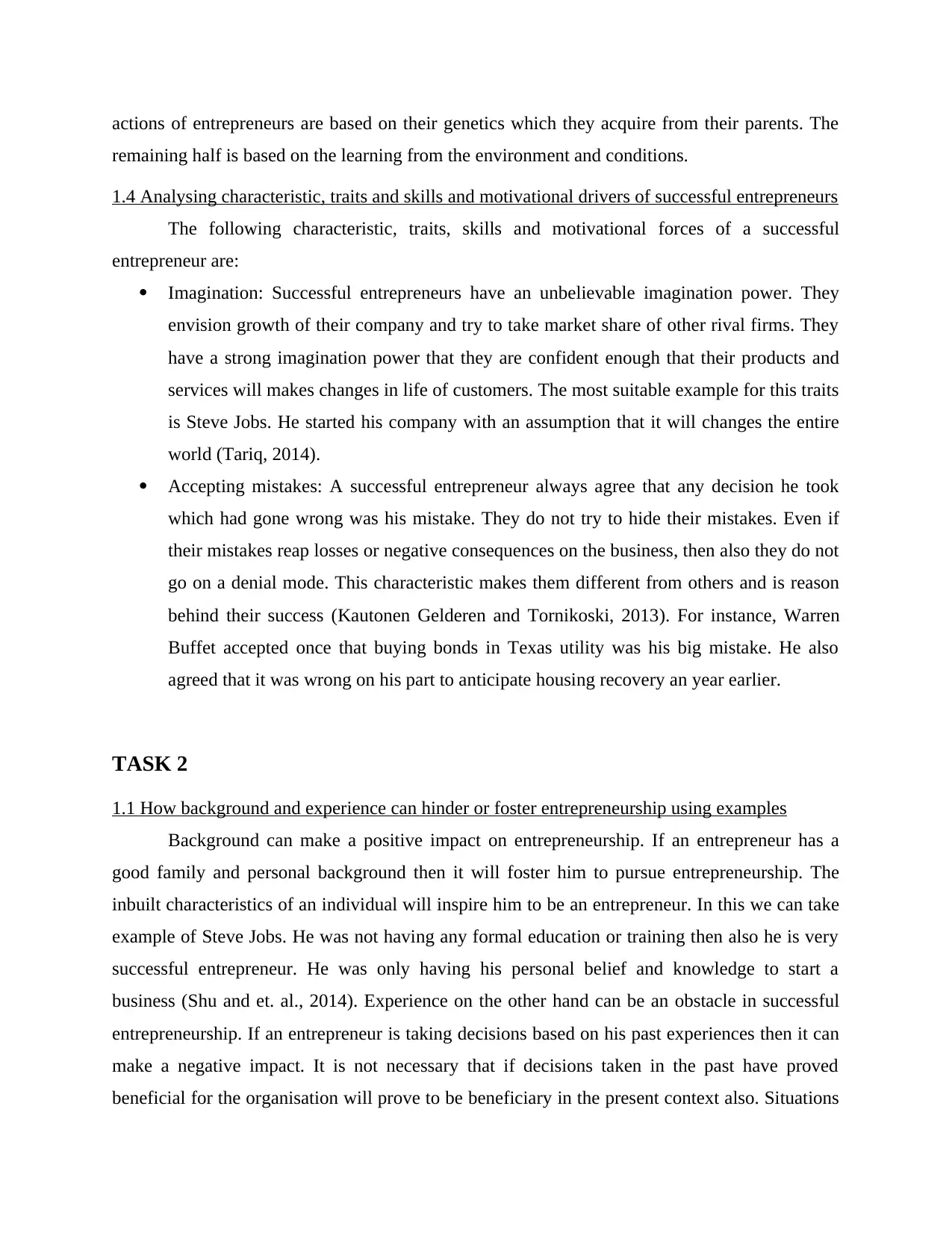
actions of entrepreneurs are based on their genetics which they acquire from their parents. The
remaining half is based on the learning from the environment and conditions.
1.4 Analysing characteristic, traits and skills and motivational drivers of successful entrepreneurs
The following characteristic, traits, skills and motivational forces of a successful
entrepreneur are:
Imagination: Successful entrepreneurs have an unbelievable imagination power. They
envision growth of their company and try to take market share of other rival firms. They
have a strong imagination power that they are confident enough that their products and
services will makes changes in life of customers. The most suitable example for this traits
is Steve Jobs. He started his company with an assumption that it will changes the entire
world (Tariq, 2014).
Accepting mistakes: A successful entrepreneur always agree that any decision he took
which had gone wrong was his mistake. They do not try to hide their mistakes. Even if
their mistakes reap losses or negative consequences on the business, then also they do not
go on a denial mode. This characteristic makes them different from others and is reason
behind their success (Kautonen Gelderen and Tornikoski, 2013). For instance, Warren
Buffet accepted once that buying bonds in Texas utility was his big mistake. He also
agreed that it was wrong on his part to anticipate housing recovery an year earlier.
TASK 2
1.1 How background and experience can hinder or foster entrepreneurship using examples
Background can make a positive impact on entrepreneurship. If an entrepreneur has a
good family and personal background then it will foster him to pursue entrepreneurship. The
inbuilt characteristics of an individual will inspire him to be an entrepreneur. In this we can take
example of Steve Jobs. He was not having any formal education or training then also he is very
successful entrepreneur. He was only having his personal belief and knowledge to start a
business (Shu and et. al., 2014). Experience on the other hand can be an obstacle in successful
entrepreneurship. If an entrepreneur is taking decisions based on his past experiences then it can
make a negative impact. It is not necessary that if decisions taken in the past have proved
beneficial for the organisation will prove to be beneficiary in the present context also. Situations
remaining half is based on the learning from the environment and conditions.
1.4 Analysing characteristic, traits and skills and motivational drivers of successful entrepreneurs
The following characteristic, traits, skills and motivational forces of a successful
entrepreneur are:
Imagination: Successful entrepreneurs have an unbelievable imagination power. They
envision growth of their company and try to take market share of other rival firms. They
have a strong imagination power that they are confident enough that their products and
services will makes changes in life of customers. The most suitable example for this traits
is Steve Jobs. He started his company with an assumption that it will changes the entire
world (Tariq, 2014).
Accepting mistakes: A successful entrepreneur always agree that any decision he took
which had gone wrong was his mistake. They do not try to hide their mistakes. Even if
their mistakes reap losses or negative consequences on the business, then also they do not
go on a denial mode. This characteristic makes them different from others and is reason
behind their success (Kautonen Gelderen and Tornikoski, 2013). For instance, Warren
Buffet accepted once that buying bonds in Texas utility was his big mistake. He also
agreed that it was wrong on his part to anticipate housing recovery an year earlier.
TASK 2
1.1 How background and experience can hinder or foster entrepreneurship using examples
Background can make a positive impact on entrepreneurship. If an entrepreneur has a
good family and personal background then it will foster him to pursue entrepreneurship. The
inbuilt characteristics of an individual will inspire him to be an entrepreneur. In this we can take
example of Steve Jobs. He was not having any formal education or training then also he is very
successful entrepreneur. He was only having his personal belief and knowledge to start a
business (Shu and et. al., 2014). Experience on the other hand can be an obstacle in successful
entrepreneurship. If an entrepreneur is taking decisions based on his past experiences then it can
make a negative impact. It is not necessary that if decisions taken in the past have proved
beneficial for the organisation will prove to be beneficiary in the present context also. Situations
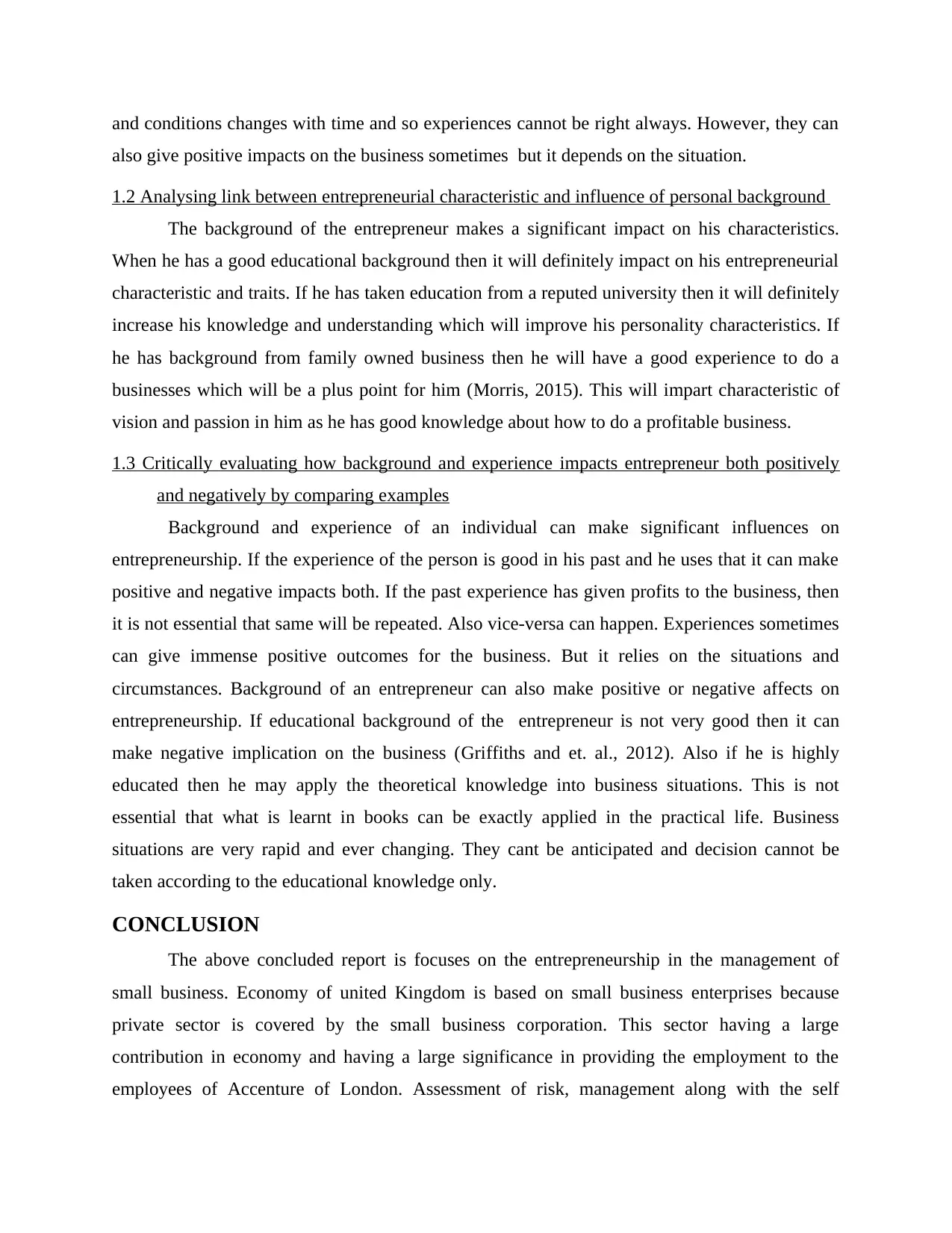
and conditions changes with time and so experiences cannot be right always. However, they can
also give positive impacts on the business sometimes but it depends on the situation.
1.2 Analysing link between entrepreneurial characteristic and influence of personal background
The background of the entrepreneur makes a significant impact on his characteristics.
When he has a good educational background then it will definitely impact on his entrepreneurial
characteristic and traits. If he has taken education from a reputed university then it will definitely
increase his knowledge and understanding which will improve his personality characteristics. If
he has background from family owned business then he will have a good experience to do a
businesses which will be a plus point for him (Morris, 2015). This will impart characteristic of
vision and passion in him as he has good knowledge about how to do a profitable business.
1.3 Critically evaluating how background and experience impacts entrepreneur both positively
and negatively by comparing examples
Background and experience of an individual can make significant influences on
entrepreneurship. If the experience of the person is good in his past and he uses that it can make
positive and negative impacts both. If the past experience has given profits to the business, then
it is not essential that same will be repeated. Also vice-versa can happen. Experiences sometimes
can give immense positive outcomes for the business. But it relies on the situations and
circumstances. Background of an entrepreneur can also make positive or negative affects on
entrepreneurship. If educational background of the entrepreneur is not very good then it can
make negative implication on the business (Griffiths and et. al., 2012). Also if he is highly
educated then he may apply the theoretical knowledge into business situations. This is not
essential that what is learnt in books can be exactly applied in the practical life. Business
situations are very rapid and ever changing. They cant be anticipated and decision cannot be
taken according to the educational knowledge only.
CONCLUSION
The above concluded report is focuses on the entrepreneurship in the management of
small business. Economy of united Kingdom is based on small business enterprises because
private sector is covered by the small business corporation. This sector having a large
contribution in economy and having a large significance in providing the employment to the
employees of Accenture of London. Assessment of risk, management along with the self
also give positive impacts on the business sometimes but it depends on the situation.
1.2 Analysing link between entrepreneurial characteristic and influence of personal background
The background of the entrepreneur makes a significant impact on his characteristics.
When he has a good educational background then it will definitely impact on his entrepreneurial
characteristic and traits. If he has taken education from a reputed university then it will definitely
increase his knowledge and understanding which will improve his personality characteristics. If
he has background from family owned business then he will have a good experience to do a
businesses which will be a plus point for him (Morris, 2015). This will impart characteristic of
vision and passion in him as he has good knowledge about how to do a profitable business.
1.3 Critically evaluating how background and experience impacts entrepreneur both positively
and negatively by comparing examples
Background and experience of an individual can make significant influences on
entrepreneurship. If the experience of the person is good in his past and he uses that it can make
positive and negative impacts both. If the past experience has given profits to the business, then
it is not essential that same will be repeated. Also vice-versa can happen. Experiences sometimes
can give immense positive outcomes for the business. But it relies on the situations and
circumstances. Background of an entrepreneur can also make positive or negative affects on
entrepreneurship. If educational background of the entrepreneur is not very good then it can
make negative implication on the business (Griffiths and et. al., 2012). Also if he is highly
educated then he may apply the theoretical knowledge into business situations. This is not
essential that what is learnt in books can be exactly applied in the practical life. Business
situations are very rapid and ever changing. They cant be anticipated and decision cannot be
taken according to the educational knowledge only.
CONCLUSION
The above concluded report is focuses on the entrepreneurship in the management of
small business. Economy of united Kingdom is based on small business enterprises because
private sector is covered by the small business corporation. This sector having a large
contribution in economy and having a large significance in providing the employment to the
employees of Accenture of London. Assessment of risk, management along with the self
⊘ This is a preview!⊘
Do you want full access?
Subscribe today to unlock all pages.

Trusted by 1+ million students worldwide

development based on needs of situations and there are some characteristics which succour
entrepreneurs in improving their potentials. There are several entrepreneurs who are working in
different sectors which aid in increasing the value of merchandise and services for their buyers.
entrepreneurs in improving their potentials. There are several entrepreneurs who are working in
different sectors which aid in increasing the value of merchandise and services for their buyers.
Paraphrase This Document
Need a fresh take? Get an instant paraphrase of this document with our AI Paraphraser
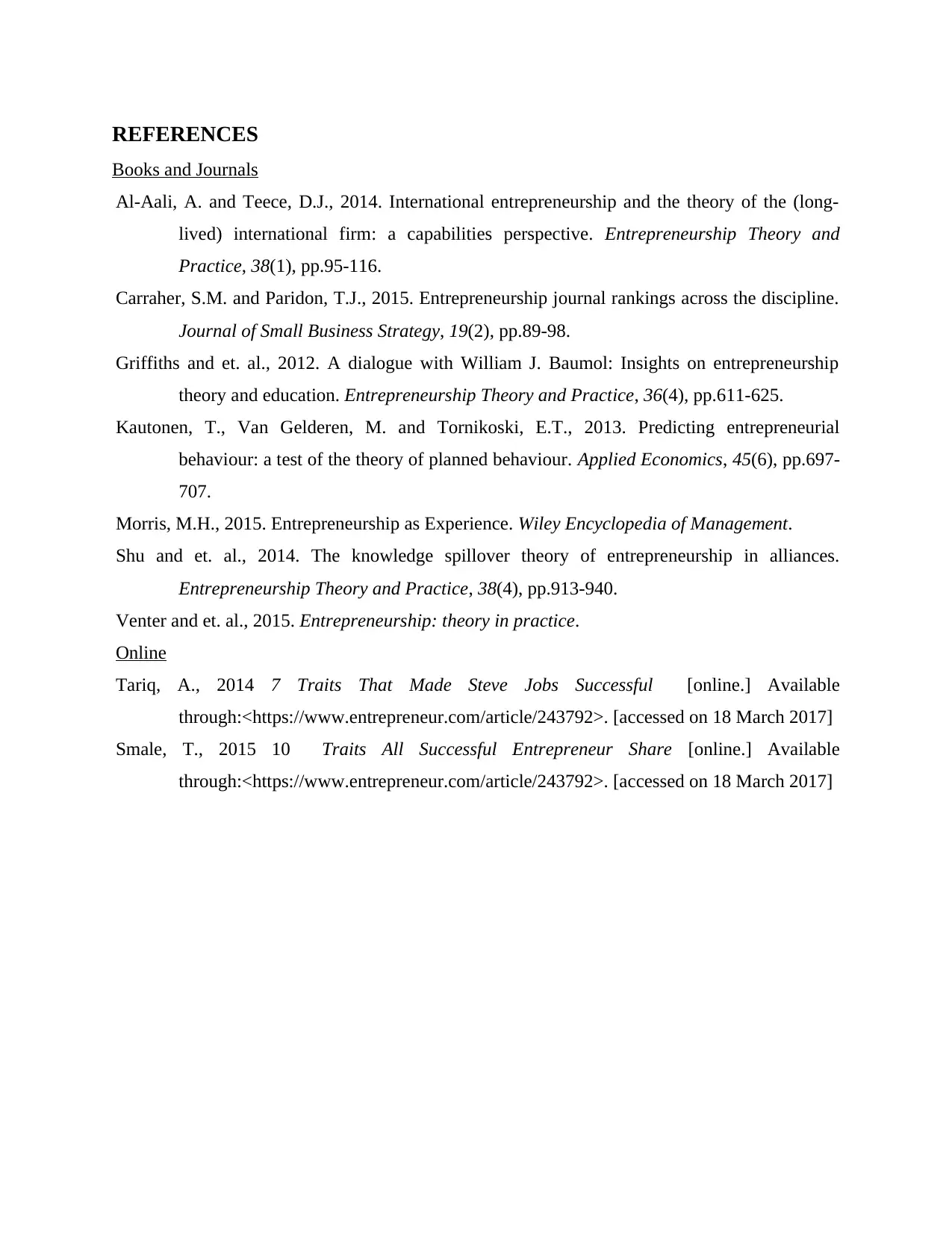
REFERENCES
Books and Journals
Al‐Aali, A. and Teece, D.J., 2014. International entrepreneurship and the theory of the (long‐
lived) international firm: a capabilities perspective. Entrepreneurship Theory and
Practice, 38(1), pp.95-116.
Carraher, S.M. and Paridon, T.J., 2015. Entrepreneurship journal rankings across the discipline.
Journal of Small Business Strategy, 19(2), pp.89-98.
Griffiths and et. al., 2012. A dialogue with William J. Baumol: Insights on entrepreneurship
theory and education. Entrepreneurship Theory and Practice, 36(4), pp.611-625.
Kautonen, T., Van Gelderen, M. and Tornikoski, E.T., 2013. Predicting entrepreneurial
behaviour: a test of the theory of planned behaviour. Applied Economics, 45(6), pp.697-
707.
Morris, M.H., 2015. Entrepreneurship as Experience. Wiley Encyclopedia of Management.
Shu and et. al., 2014. The knowledge spillover theory of entrepreneurship in alliances.
Entrepreneurship Theory and Practice, 38(4), pp.913-940.
Venter and et. al., 2015. Entrepreneurship: theory in practice.
Online
Tariq, A., 2014 7 Traits That Made Steve Jobs Successful [online.] Available
through:<https://www.entrepreneur.com/article/243792>. [accessed on 18 March 2017]
Smale, T., 2015 10 Traits All Successful Entrepreneur Share [online.] Available
through:<https://www.entrepreneur.com/article/243792>. [accessed on 18 March 2017]
Books and Journals
Al‐Aali, A. and Teece, D.J., 2014. International entrepreneurship and the theory of the (long‐
lived) international firm: a capabilities perspective. Entrepreneurship Theory and
Practice, 38(1), pp.95-116.
Carraher, S.M. and Paridon, T.J., 2015. Entrepreneurship journal rankings across the discipline.
Journal of Small Business Strategy, 19(2), pp.89-98.
Griffiths and et. al., 2012. A dialogue with William J. Baumol: Insights on entrepreneurship
theory and education. Entrepreneurship Theory and Practice, 36(4), pp.611-625.
Kautonen, T., Van Gelderen, M. and Tornikoski, E.T., 2013. Predicting entrepreneurial
behaviour: a test of the theory of planned behaviour. Applied Economics, 45(6), pp.697-
707.
Morris, M.H., 2015. Entrepreneurship as Experience. Wiley Encyclopedia of Management.
Shu and et. al., 2014. The knowledge spillover theory of entrepreneurship in alliances.
Entrepreneurship Theory and Practice, 38(4), pp.913-940.
Venter and et. al., 2015. Entrepreneurship: theory in practice.
Online
Tariq, A., 2014 7 Traits That Made Steve Jobs Successful [online.] Available
through:<https://www.entrepreneur.com/article/243792>. [accessed on 18 March 2017]
Smale, T., 2015 10 Traits All Successful Entrepreneur Share [online.] Available
through:<https://www.entrepreneur.com/article/243792>. [accessed on 18 March 2017]

⊘ This is a preview!⊘
Do you want full access?
Subscribe today to unlock all pages.

Trusted by 1+ million students worldwide
1 out of 9
Related Documents
Your All-in-One AI-Powered Toolkit for Academic Success.
+13062052269
info@desklib.com
Available 24*7 on WhatsApp / Email
![[object Object]](/_next/static/media/star-bottom.7253800d.svg)
Unlock your academic potential
Copyright © 2020–2025 A2Z Services. All Rights Reserved. Developed and managed by ZUCOL.




